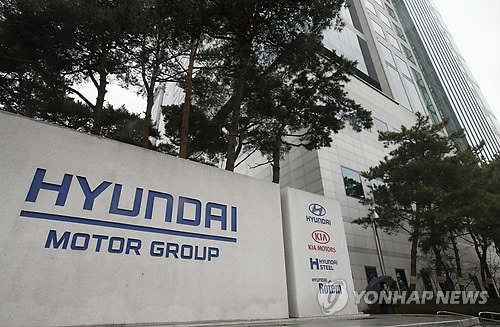Hyundai Motor Group, South Korea’s second-largest conglomerate, said Tuesday it would implement the peak wage system across all its affiliates starting from 2016.
Under this system pushed by the government and being picked up by an increasing number of companies, the retirement age has been extended to 60 from the current range of 53 to 58 and the paycheck for elderly workers slashed by about 10 percent over their last several years at work.
The group plans to channel the saved funds into hiring more young recruits every year, in a bid to lend a hand in reviving the nation’s stagnant labor market.
“While implementing a peak wage system across all of the group’s companies, we plan to create more than 1,000 new jobs for young Koreans every year,” said a Hyundai Motor Group official.
 |
The Hyundai Motor Group headquarters in Seoul (Yonhap) |
The group said it is also looking to “provide support for prospective retirees, offering programs for reemployment, opening new businesses and postretirement planning, among other programs.”
When in place, the new work sharing system will affect some 150,000 employees at the group’s 41 affiliates. The specific implementation methods will vary depending on each company, in consultation with the group’s labor union.
Currently, the official retirement age at Hyundai Motor, Kia Motors and Hyundai Mobis is 58, while the limit is 57 at Hyundai Steel and Hyundai Engineering and Construction.
The Hyundai Motor Group management said it will hold talks with the heads of the labor union at each company to discuss details and strike a final agreement on the newly proposed system.
“The implementation of the peak wage system and increased recruitment of young employees aims to fulfill our company’s social responsibility and to strengthen our organization by recruiting new talented employees,” the group official said.
Hyundai’s bold labor reform measures come as the group has been facing declining profits amid sluggish sales at home and abroad.
Hyundai Motor and Kia Motor, the group’s core pillars, together recorded an operating profit of around 4.5 trillion won ($3.8 billion) in the first half of this year, down by 18.6 percent compared to the same period in 2014.
Hyundai Motor sold roughly 2.41 million vehicles in the first half of 2015, down 3.2 percent compared to the same period last year. At the same time, Kia Motors sold 1.52 million units this year, down 2.4 percent from 2014.
The conglomerate’s moves are expected to “fuel further industry discussion on implementing the peak wage system” and “offer job security for older employees and fresh opportunities for young job seekers, bringing a positive influence on Korea’s stagnant employment market.” according to local employment experts.
By Sohn Ji-young (
jys@heraldcorp.com)





![[Exclusive] Hyundai Mobis eyes closer ties with BYD](http://res.heraldm.com/phpwas/restmb_idxmake.php?idx=644&simg=/content/image/2024/11/25/20241125050044_0.jpg)
![[Herald Review] 'Gangnam B-Side' combines social realism with masterful suspense, performance](http://res.heraldm.com/phpwas/restmb_idxmake.php?idx=644&simg=/content/image/2024/11/25/20241125050072_0.jpg)

